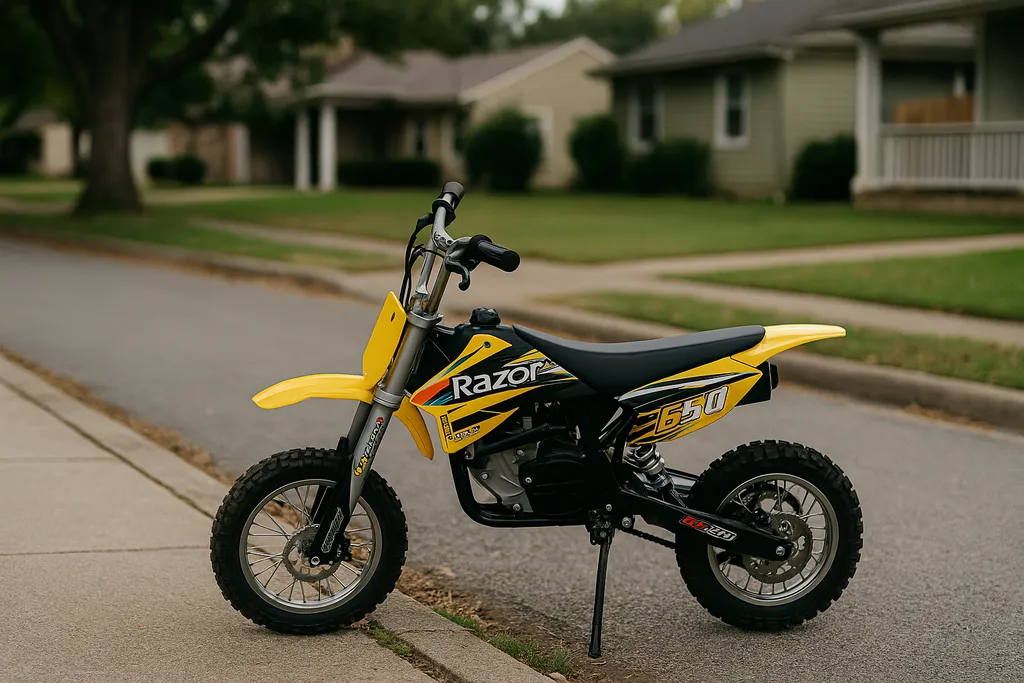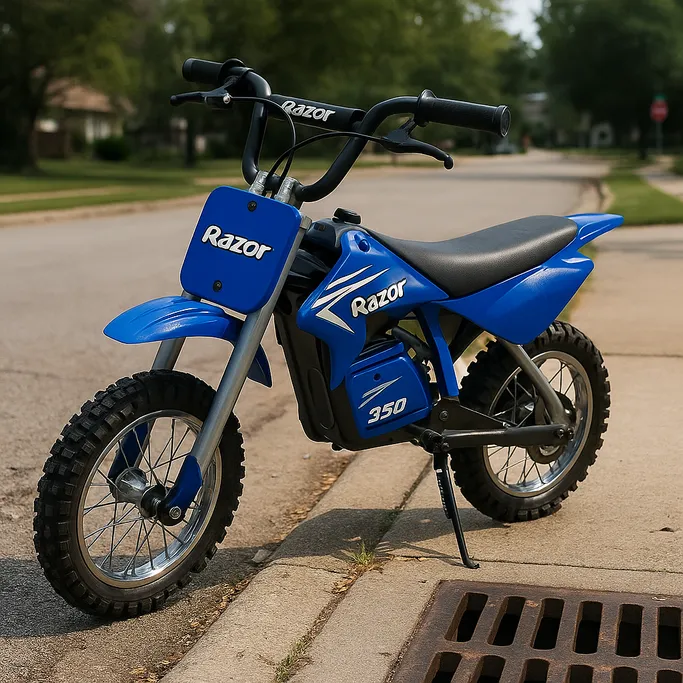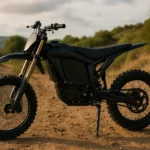Are Razor electric dirt bike street legal out of the box? That’s the big question rattling around every parent group, local Facebook marketplace listing, and electric bike forum lately.
Whether it’s the Razor MX350, MX500, or MX650, these entry-level electric dirt bikes are everywhere — but very few riders actually know if it’s legal to ride them in public spaces.
And hey, we get it. These bikes are cheap, fun, and super popular with kids and teens.
But before you take that silent mini-beast down the sidewalk or onto the street, there are some laws you seriously need to know. 😬
In this guide, we’ll dig into whether Razor electric dirt bikes are street legal, how state and federal rules classify these models, and what you can (and can’t) do with them.
You’ll also find some real talk about the MX350, MX500, and MX650, plus info on how to avoid trouble with the law.
This isn’t legal mumbo jumbo — it’s the stuff every rider (and parent) needs to read.
Key Takeaways
- Razor bikes like the MX350 and MX650 are not street legal in most places 🚫
- The legality depends on classification laws by city and state 🏛️
- With heavy modification, some Razor models might qualify — but it’s not easy 🛠️
- You’re safer riding these bikes on private property or trails, not city streets 🌳
- Breaking local laws can lead to fines or confiscation, especially for minors 👮
⚡ What’s Covered in This Guide:
Use the quick links below to jump to the part you care about most 👇
Are Razor Electric Dirt Bikes Street Legal by Default?
So, are Razor electric dirt bike street legal straight out of the box? In short: no.
The vast majority of Razor models — including the MX350, MX500, MX650, and even the sporty SX500 — are not manufactured to meet the legal standards for use on public roads.
These bikes are considered recreational off-road vehicles, which means they’re built for backyards, dirt trails, and private property — not for sidewalks, bike lanes, or city streets.
They’re missing several essential features required by law for road use, such as:
- Headlights and taillights
- Turn signals
- Mirrors
- Horn
- VIN number
- DOT-approved tires and parts
- Speedometer and odometer
Since they don’t come with the proper equipment or certifications, Razor electric dirt bikes are not street legal in most jurisdictions.
Trying to ride them on roads may get you flagged by police — especially if you’re underage or riding without a helmet.
Some riders mistakenly assume that because these bikes are electric and small, they fall into the same category as electric scooters or bicycles.
But the law doesn’t see it that way. Most states don’t classify them as e-bikes or low-speed vehicles, which makes them a legal gray area — and that’s not a place you want to be. 😬
The bottom line? If you’re asking, “are Razor electric dirt bike street legal?”, the answer is nearly always no, unless you’re using them on private land or inside specific off-road zones.
Riding them on public roads without registration or the required equipment could result in fines, warnings, or worse — bike confiscation.
And while the law varies from place to place, one thing is consistent: Razor models like the MX650 were not made with street legality in mind.
They’re toys in the eyes of the law — powerful toys, but still toys. 🧸⚡
We’ll explore some exceptions and modifications later, but for now, understand this:
Are Razor electric dirt bike street legal in default condition? No.
Are they fun? Absolutely.
Are they road-ready? Not without serious work.
Next up, let’s break down how each popular Razor model is classified under the law and why that matters.

Comparing Popular Razor Models and Their Legal Classification
When it comes to understanding are Razor electric dirt bike street legal, the answer heavily depends on which model you’re riding.
Each Razor bike has its own specs — like motor wattage, top speed, and intended use — and these directly impact how it’s classified under the law.
Let’s break down the most popular models and how they’re typically viewed by local and state authorities 👇
Razor MX350 & MX400 – Entry-Level Fun, Not Legal Machines
These two are almost identical in design and performance. Built for younger riders (ages 13+), the Razor MX350 and MX400 top out at around 14 mph, powered by a 250W chain-driven motor.
They lack lights, mirrors, VIN numbers, and other road safety equipment — which automatically makes them non-compliant with DOT or DMV standards.
From a legal standpoint, these bikes are seen as electric toys or recreational off-road vehicles. That means you cannot legally ride them on:
- Sidewalks
- Bike lanes
- Public roads
- Parks with street traffic
In most places, if law enforcement spots one on public ground, you’re asking for a citation. 👮♂️
Razor MX500, SX500, RSF650 – More Power, Same Legal Issues
Stepping up the ladder, bikes like the MX500, SX500 McGrath, and RSF650 deliver more punch — with motors ranging from 500W to 650W and speeds up to 17 mph.
But despite this boost in performance, they’re still not considered street legal.
Here’s why:
- They still lack basic road safety features
- They don’t have vehicle identification numbers (VINs)
- They can’t be registered or insured for road use
- Their design is off-road first, not commuter focused
These bikes are often mistaken for electric mopeds due to their frame size and power. But they don’t meet the legal criteria for mopeds or e-scooters in most U.S. states.
Razor Pocket Mods & Other Variants
Even street-style models like the Razor Pocket Mod aren’t exempt. They look more like scooters, but they fall into the same legal gray area.
The absence of safety equipment and street certification makes them illegal for public roads in nearly all areas.
So, are Razor electric dirt bike street legal if you choose a more powerful model? Unfortunately, no.
Whether it’s the beginner-friendly MX350 or the beefier RSF650, none of these models are built for road legality.
Instead, they belong on:
- Dirt tracks
- Backyard trails
- Private driveways
- Off-road parks
Still thinking about riding your Razor to school or work? Keep reading — we’ll cover how laws differ by state next and what happens if you try to bend the rules. 😅
Federal vs State vs City Laws (And Why It’s So Confusing)
Here’s where things get real messy: even if you understand that Razor electric dirt bikes are not street legal, the actual rules change depending on where you live. 😵
A Razor MX350 might be seen as a toy in one city, but treated like an illegal vehicle in another. Let’s break it down by layers of law to clear the fog.
Federal Laws – What the U.S. Government Says
At the federal level, the Consumer Product Safety Commission (CPSC) and the National Highway Traffic Safety Administration (NHTSA) define how electric vehicles are classified.
But here’s the catch: Razor electric dirt bikes don’t fit neatly into any category. They’re too powerful to be electric toys and too under-equipped to be e-bikes or mopeds.
That leaves them floating in a gray zone — not officially road-legal, but also not heavily regulated at the national level.
🔗 Helpful Source: NHTSA – Vehicle Classification Guide
So, if you’re wondering are Razor electric dirt bike street legal under federal law, the answer is: they’re not even in the conversation.
The feds don’t ban them, but they don’t approve them either.
State Laws – Wildly Different Rules from State to State
Each state has its own DMV or transportation authority — and each one makes its own rules for electric vehicles.
Let’s look at some examples:
- California: Requires registration, VIN, and DOT compliance for street use. Razor bikes? ❌
- New York: Bans off-road e-bikes on public streets, with heavy enforcement in NYC. Razor MX350 = 🚫
- Florida: Allows some electric bikes on roads if they meet specific criteria — Razor dirt bikes don’t.
- Texas: Similar to Florida, but stricter on motor power. No license = no ride.
Bottom line: are Razor electric dirt bike street legal in your state? Probably not — unless you live somewhere that ignores the rules (not recommended).
Local City Laws – The Final Nail in the Razor Coffin
Even if your state is chill, cities can have tighter restrictions. Some municipalities have:
- Sidewalk bans for electric-powered vehicles
- Helmet requirements for all motorized riders
- Rules against riding any unregistered vehicle on streets, trails, or sidewalks
Example: In many suburbs, police can fine you just for riding the Razor MX650 down your own neighborhood road, even at slow speeds.
That means when people ask “are Razor electric dirt bike street legal in my town?”, the real answer is: you’d better check your local code or risk a ticket. 💸
So to recap this legal mess:
- Federal law doesn’t officially ban Razor bikes — but doesn’t legalize them either
- State law often classifies them as off-road only
- City law can be the most aggressive in enforcement
That’s three layers of “no” — and counting. 😬
Still thinking of hitting the road on your MX500? Hold that thought — next we’ll explore whether it’s even possible to make a Razor dirt bike street legal.
Can You Make a Razor Dirt Bike Street Legal?
Here’s the golden question every DIY rider asks at some point: Can I modify my Razor to make it road legal?
And more importantly — are Razor electric dirt bike street legal if I upgrade them myself?
Short answer: maybe. But it’s a bureaucratic nightmare and often not worth the effort. Let’s break down what it actually takes. 🧰
What You’d Need to Add
To even begin the process of street legalizing a Razor bike like the MX350 or MX650, you’d have to add a list of mandatory safety equipment, including:
- DOT-approved headlights and taillights
- Brake lights connected to the lever system
- Turn signals (front and rear)
- A working horn
- One or two rearview mirrors
- Reflectors (sides, front, rear)
- A speedometer
- A valid VIN number
- DOT-rated tires
- Stronger suspension and frame reinforcements (optional but recommended)
Even with all that, there’s no guarantee the DMV will approve it.
The DMV Gauntlet: Inspections, Forms, and Frustration
Let’s say you somehow bolt on everything listed above. Your next steps?
- Get a certified inspection from your state DMV or authorized mechanic
- Apply for a special vehicle classification (often as a moped or low-speed electric vehicle)
- Pay any fees, taxes, or registration costs
- Obtain insurance if required by your state
- Cross your fingers that they accept your application 🤞
Most Razor electric dirt bikes were never intended for this process.
They lack a frame-engraved VIN, and their specs (battery, motor, etc.) often don’t meet minimum safety requirements for road use — even after modification.
So if you’re still asking are Razor electric dirt bike street legal after mods?
In theory — yes.
In practice — not easily, and not everywhere.
Is It Worth It?
Honestly? Probably not. 😅
The total cost of upgrades and paperwork can quickly exceed $600–$900, depending on your state.
And that’s assuming you know how to install electrical components safely.
For that price, you’re better off buying:
- A street-legal electric scooter
- A DOT-certified e-bike or e-moped
- Or even a second-hand licensed ride from a local dealer
None of that comes with the legal uncertainty you’ll face riding a heavily-modded Razor MX500 down a public road.
So, to sum it up:
Are Razor electric dirt bike street legal with upgrades? Technically yes, legally questionable, and financially dumb unless you’re just doing it for the thrill of the project. 😉
Next, we’ll show you safer and fully legal alternatives that won’t land you a ticket.
Safer (and Legal) Alternatives for Urban Use
If you’ve made it this far, you already know the answer to are Razor electric dirt bike street legal is pretty much a resounding no — unless you want to dive into mods, paperwork, and DMV drama. 😅
So let’s shift gears. Instead of trying to fight the system, why not go with alternatives that are 100% legal, safer, and built for urban use right out of the box?
Razor Models That Are Legal for the Streets (Sort of)
Believe it or not, Razor does make a few models that are designed with urban riding in mind — just not the MX dirt bike series. Here are some options worth looking at:
- Razor EcoSmart Metro 🛵
Comes with large pneumatic tires, a bamboo deck, a comfy seat, and even a basket. More importantly, it includes basic road-ready features and is technically considered an electric scooter in many states. - Razor E300/E Prime Series
These scooters aren’t technically bikes, but they often fall into the same classification as e-scooters, which are allowed on roads or bike lanes depending on local laws.
These are far from dirt bikes, but if your goal is commuting legally and safely, they’re worth a serious look.
Legit Off-Road Options (Where Razor Shines)
Not every rider wants a street-legal vehicle. Some just want to shred dirt trails, explore woods, or ride in wide open spaces — no traffic, no cops, no problems.
If that’s your style, then Razor electric dirt bikes still deliver the fun:
- MX350 and MX650 are perfect for:
- Large backyards 🏡
- Off-road tracks 🏁
- Dirt fields, ranches, or motocross parks 🌄
- Campgrounds with private trails 🏕️
Just make sure wherever you ride, it’s off public roads and ideally on private property with permission.
Better Alternatives from Other Brands
Still looking for something that looks like a Razor dirt bike but is actually legal for road use? Check out these solid competitors:
- Segway X260 or X160 (with street-legal kits)
- Juiced Bikes HyperScorpion
- Super73 RX series (DOT-compliant and stylish as hell)
These bikes come with headlights, mirrors, turn signals, VINs, and everything needed to pass as legit street-legal rides in many states.
So, instead of forcing a Razor MX650 onto a street it was never meant for, consider switching to a bike that was designed to follow the rules.
Trust us — it’ll save you cash, headaches, and maybe even a run-in with the law. 🚓
Up next: let’s look at some real stories of what happens when people don’t play by the rules.
Real Stories: Riders Getting Fined or Bikes Confiscated
Still wondering are Razor electric dirt bike street legal in the real world?
Let’s step away from the theory for a second and dive into some real-life cases — where riders found out the hard way that their Razor wasn’t street legal. 👀
Case #1: Teen Fined $200 in New York City
A 14-year-old in Queens was riding his Razor MX650 down a neighborhood street when NYPD stopped him.
No lights, no license plate, no helmet — result? A $200 ticket and a warning to the parents. The officer reportedly said, “If we see him again, we’re taking the bike.”
Why? Because Razor electric dirt bikes are not street legal in NYC, and they’re classified as illegal motorized vehicles when used on public roads.
Case #2: Bike Seized in Suburban California
A 16-year-old used his Razor MX500 to commute to school in a small California suburb. He was stopped by local police, and the bike was confiscated on the spot.
Parents had to pay a fine and fight the impound just to get it back — and it wasn’t even registered.
Even in less strict towns, riding an unregistered, non-compliant vehicle on public streets violates California’s DMV code.
Case #3: Facebook Marketplace Nightmares
Multiple parents in e-bike groups have shared stories of buying used Razor MX350s thinking they were legal for street use — only to find out from local police (or worse, a fine) that the bikes were for off-road use only.
One post said:
“Bought it for my 12-year-old to ride around the block. Within a week, cops told us if he rides again, they’ll take it. Now it just sits in the garage.”
Why These Incidents Matter
These stories aren’t outliers. They’re warning signs. Because while these bikes look harmless — and are marketed as “kids bikes” — the law doesn’t care.
Riding one down the street without proper equipment or licensing can lead to:
- Fines 💸
- Bike seizure 🛑
- Legal trouble for parents 👨👩👧
- Permanent bans from riding in some public spaces
So, back to the big question:
Are Razor electric dirt bike street legal in practice? Nope. And real-world stories prove it.
Avoid being the next Facebook post with a sad garage photo and a citation pinned to it. 😉
Coming up — we’ll tackle the most asked questions about Razor dirt bike legality.
FAQs – Razor Electric Dirt Bike Legal Questions
We get tons of questions from parents, riders, and curious buyers who all ask some version of: are Razor electric dirt bike street legal or not?
Let’s clear up the most common doubts once and for all. 🧠
Can I ride my Razor MX350 on the street?
No. The Razor MX350 is classified as a recreational off-road vehicle and is not street legal. It lacks headlights, mirrors, signals, a VIN, and other required components for road use. Even riding it on the sidewalk or in a neighborhood can result in fines depending on your local laws.
Do I need a license for a Razor electric dirt bike?
Generally, no license is required to ride one — because they’re not allowed on public roads in the first place. However, using them where they’re not permitted (like streets, sidewalks, or parks) can still lead to enforcement, even if you don’t need a driver’s license.
Are there any Razor bikes that are legal on public roads?
Some Razor electric scooters (like the EcoSmart Metro) may be allowed in areas where electric scooters are permitted. But Razor dirt bikes like the MX350, MX500, or MX650 are not road legal, even with modifications.
So again: are Razor electric dirt bike street legal in their default form or modified? Still no — unless your jurisdiction somehow approves it after full conversion (which is rare).
What happens if I get caught riding it in public?
You might be:
- Fined (typically $100–$300)
- Given a warning
- Have the bike confiscated
- Get cited for endangering pedestrians or violating motor vehicle laws
And yes — parents can be held responsible if a minor is caught breaking these rules.
Can a 13-year-old legally ride a Razor MX650 in a park?
Only if the park is private property or specifically allows off-road electric vehicles. Many public parks or trails do not allow any motorized vehicles — even electric ones — unless they meet ADA or special-use exceptions.
So before you assume it’s OK, check the rules of the park or ask local authorities. When in doubt, keep it on private land.
These questions keep coming because the bikes look street-ready, but legally they’re not even close.
That’s why repeating the question are Razor electric dirt bike street legal is necessary — because most people don’t realize the legal gray area they’re entering.
Coming up next: let’s wrap it all up with a clear verdict — and point you to safer ways to ride.
Final Verdict: Razor Dirt Bikes Are Fun, But Not for the Streets
So, after breaking it all down — specs, laws, horror stories, and modifications — what’s the final answer to the big question?
Are Razor electric dirt bike street legal?
No. And trying to force them into that category can be more trouble than it’s worth. ❌
The MX350, MX500, MX650, and similar models are awesome for what they were built for: off-road fun, backyard trails, and private property riding.
They’re affordable, easy to use, and super fun for kids and teens learning to ride. But they’re not street legal. Not by default. Not even close.
Even if you invest in heavy modifications, the process to legalize one is complex, expensive, and very likely to be rejected by your local DMV or police.
And riding without proper compliance opens the door to:
- Fines or citations
- Bike impoundment
- Legal issues for parents or guardians
- Safety hazards for both rider and others
If you’re looking for something road-ready, your best bet is to choose a model designed with street legality in mind — whether it’s a Razor electric scooter, a DOT-compliant e-bike, or a certified electric moped.
And if off-road is your jam, then go all in — but ride where it’s allowed. Don’t get yourself or your kid in trouble for trying to take a toy where a real vehicle is required.
🔗 Internal Link: Want the full breakdown of how electric dirt bikes are classified and what makes one legal or not? Check out our full guide: Are Electric Dirt Bikes Street Legal? Everything You Need to Know Before Hitting the Road
Share Your Story or Ask a Question!
Have you ever tried to ride a Razor electric dirt bike on the street? Did you get stopped? Mod it? Or maybe you found a better solution?
Drop your story in the comments or tag us on social media!
And if this guide helped you, share it with another parent, rider, or neighbor who might be thinking about doing the same.
Let’s keep each other safe, smart, and in the loop. 🤝⚡

Tyler Brooks is the storyteller behind most of the content at Electric Dirt Zone. With over 10 years of experience in digital media and a lifelong love for off-road riding, he blends technical insight from the team with engaging, down-to-earth writing. When he’s not turning dusty trail rides into blog posts, you’ll probably find him snapping pics before things get too wild.






